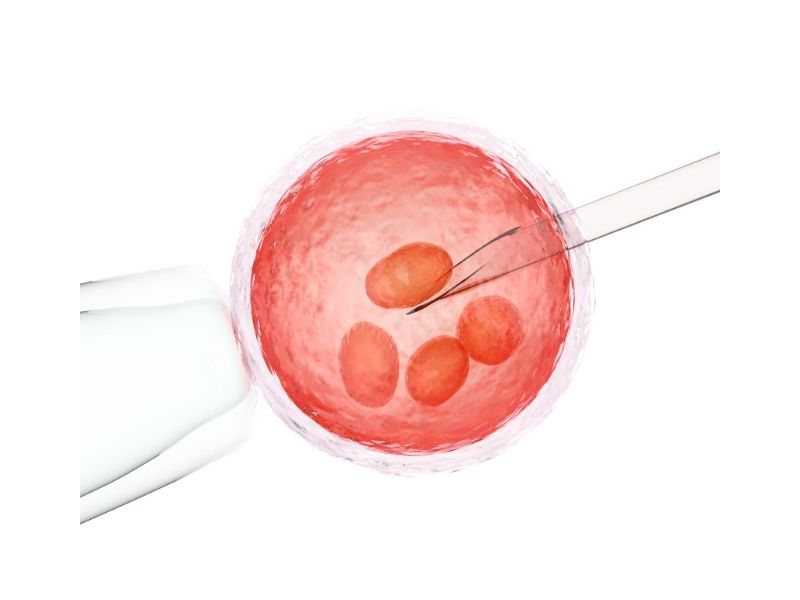What is Embryo Glue?
Embryo glue is a special solution used during embryo transfer in IVF treatment. Also referred to as a “culture medium supplement,” embryo glue is a newly developed culture medium used specifically for embryo transfer.
In the lab, embryos are typically grown in culture media that mimic the environment inside the mother's body. During the transfer, embryos are loaded into a catheter along with embryo glue, and together, they are placed into the uterus.
Embryo glue contains ingredients that create a healthy microenvironment for the embryo. Its high levels of hyaluronic acid help form a bond between the embryo and the uterine lining, making implantation easier. Additionally, it helps the embryo remain in place within the uterus, thereby increasing the chances of a successful implantation.
Hyaluronic acid is naturally present in ovarian follicular fluid, within the uterus, and in the fallopian tubes. The high concentration of hyaluronic acid in embryo glue is essential because it closely resembles the uterus's natural environment.
The purpose of embryo glue is to provide the embryo with an adhesive-like substance, encouraging it to attach to the uterine lining and prevent miscarriage. This way, the embryo's position remains stable after transfer, enhancing implantation success and improving the likelihood of pregnancy.
Who Should Use Embryo Glue?
Embryo glue can be used for any couple diagnosed with infertility and undergoing IVF treatment. However, each couple is unique, and it is up to the IVF specialist to decide who might benefit from embryo glue. It should not be recommended routinely for all IVF cases, as each couple should be assessed individually, with fertility experts deciding based on the individual’s specific circumstances. Some situations where embryo glue may be particularly beneficial include:
- Women with recurrent miscarriages
- Couples who have experienced failed IVF attempts
- Couples with certain medical issues; for example, if there are conditions that adversely affect the uterine lining or embryo development, embryo glue can improve implantation chances.
The growing importance of embryo glue in IVF treatments offers hope to couples aspiring to have children. However, it’s essential to understand that the effectiveness of embryo glue can vary from patient to patient, and its use should be based on medical recommendations.

Who Should Use Embryo Glue?
Does Embryo Glue Harm Embryos?
Embryo glue contains hyaluronan, a natural substance found in the body, and studies have shown no adverse effects associated with its use. Due to its natural composition, embryo glue does not harm embryos.
How Does Embryo Glue Work?
Hyaluronic acid in embryo glue forms a sticky solution that helps the embryo remain stable within the uterus, creating a natural environment that supports embryo attachment. It also prevents the embryo from moving within the uterus, facilitating the implantation process.
EmbryoGlue also interacts with a receptor called CD44. CD44 is found both within the embryo and on the uterine lining, and its interaction with hyaluronic acid helps the embryo adhere more securely to the uterus.
Studies have shown that solutions developed for embryo transfer, like EmbryoGlue with high hyaluronic acid (HA) content, may increase pregnancy rates. The use of these substances has also been associated with an increase in live birth rates.

Effectiveness of Embryo Glue
Is the Composition of Embryo Glue the Same at Every Clinic?
The purpose of embryo glue is to mimic the natural environment of the uterus as closely as possible, enhancing the chances of embryo attachment. However, the composition and effectiveness of embryo glue can vary depending on the IVF clinic and the manufacturer. Therefore, the components and application of embryo glue are tailored to each patient’s specific situation and medical needs. While hyaluronan (hyaluronic acid) is the main ingredient, embryo glue may also include additional components like amino acids and proteins. In our clinic, we incorporate embryo glue as part of a personalized treatment plan, sharing detailed information with our patients.
Does Embryo Glue Guarantee Increased Pregnancy Rates?
Some studies indicate that the difference in success is not always significant, with low-hyaluronic acid transfer solutions showing similar results in some cases. However, it is noted that these studies may have been limited in sample size, meaning the findings are not definitive.
Overall, meta-analyses of multiple studies suggest that high-hyaluronic acid solutions used during embryo transfer may increase live birth rates. Still, more extensive research and larger clinical studies are necessary. Findings from such studies could play a vital role in refining embryo transfer techniques and improving success rates in IVF treatment.

Success Rate of Embryo Glue
What is the Success Rate of Embryo Glue?
The success rate of embryo glue can vary widely based on numerous factors, making it challenging to provide a specific number. The effectiveness of embryo glue depends on several variables, such as the quality of its components, the techniques used during embryo transfer, the patient’s medical history, and other relevant factors.
However, some clinical studies and observational data suggest that embryo glue may improve the success of embryo transfer. This is particularly attributed to its ability to mimic the intrauterine environment and potentially increase the likelihood of embryo attachment, which could lead to higher success rates.
Fertility specialists take the patient's unique situation into account to determine whether embryo glue is appropriate and effective, adjusting the treatment plan accordingly.
In conclusion, the success rate of embryo glue is a complex topic that requires thorough evaluation and careful treatment planning. It is essential to consult with a specialist to identify the best treatment options for each patient’s specific needs.







